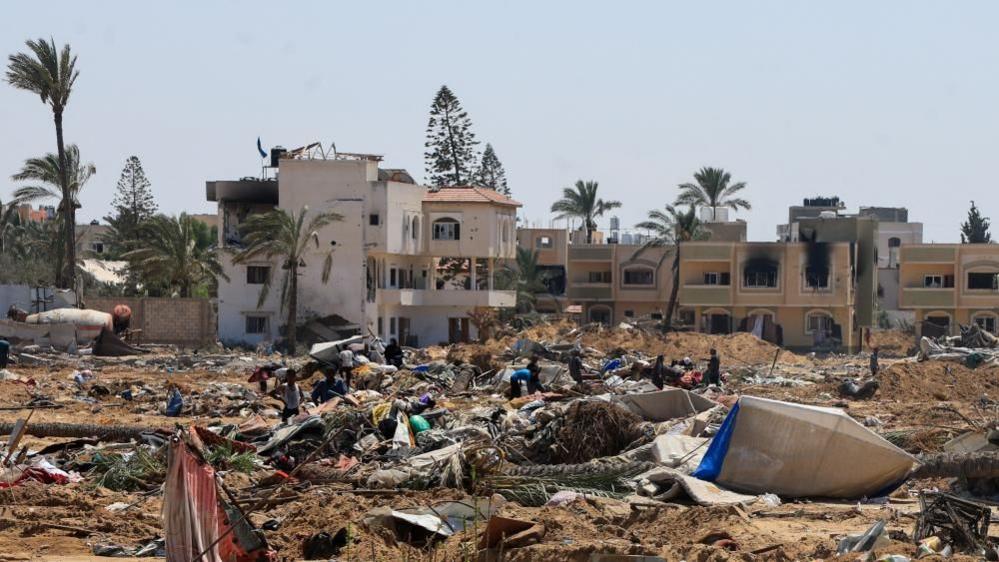Jeremy Bowen: Israel's allies see evidence of war crimes in Gaza mounting up

- Published
Two years ago, Hamas was putting the finishing touches to its plan to attack Israel. In Israel Prime Minister Benjamin Netanyahu believed that the Palestinians were a problem to be managed. The real threat, he insisted, was Iran.
Netanyahu's rhetoric opposing Hamas was undimmed, but he had also given permission for Qatar to funnel money into Gaza. It gave him space for his real priorities in foreign policy - confronting Iran and finding a way to normalise relations with Saudi Arabia.
In Washington, then-President Joe Biden and his administration believed they were close to hatching a deal between the Saudis and Israelis.
It was all a series of illusions.
Netanyahu has refused to establish an enquiry to look into the mistakes he made alongside his army and security chiefs that gave Hamas its opportunity to attack with such deadly effect on 7 October 2023.
The century-long conflict between Jews and Arabs for control of the land between the River Jordan and the Mediterranean was unresolved, festering, and about to explode into a war that looks to be as consequential as its other landmarks, in 1948 and 1967.
The Middle East has been transformed since 7 October, and almost two years into the war, the conflict in Gaza is at another inflection point.
WHO condemns Israeli attacks on facilities in central Gaza
- Published22 July
This has been a hard war for journalists to report.
They were taken by surprise on 7 October when Hamas attacked, and since then Israel has banned international journalists from Gaza to report freely. Palestinian journalists inside the Strip have done valiant work, and nearly 200 have been killed doing their jobs.
But key facts are clear. Hamas committed a series of war crimes in the attacks it launched on 7 October, killing 1,200 people, mainly Israeli civilians. Hamas took 251 hostages, of which perhaps 20 who are still being held inside Gaza are believed to be alive.
And there is clear evidence that Israel has committed a series of war crimes since then.
Israel's list includes the starvation of Gaza's civilians, the failure to protect them during military operations in which Israeli forces killed tens of thousands of innocents, and the wanton destruction of entire towns in a manner that is not proportionate to the military risk Israel faces.
Netanyahu and his former defence minister are the subject of arrest warrants for war crimes issued by the International Criminal Court. They insist on their innocence.
Israel has also condemned a legal process at the International Court of Justice which alleges that it is committing genocide against Palestinians. Israel denies the accusations, and claims they are antisemitic "blood libels".
Israel is running out of friends. Allies who rallied around after the 7 October Hamas attacks have lost patience with Israel's conduct in Gaza.
Even Israel's most important ally, Donald Trump, is reported to be losing patience with Netanyahu after being taken by surprise when the Israeli leader ordered the bombing of Damascus – attacking Syria's new regime, which Trump has recognised and encouraged.
Other western allies of Israel ran out of patience months ago.
Another joint statement, condemning Israel's actions, was signed on 21 July by foreign ministers from the UK, much of the European Union, Canada, Australia, New Zealand and Japan. They used strong words to describe civilian suffering in Gaza, and the failing and deadly aid distribution system run by the Gaza Humanitarian Foundation (GHF) that Israel introduced to replace tried and trusted methods used by the UN and leading global relief groups.
"The suffering of civilians in Gaza has reached new depths," the statement, external said.
"The Israeli government's aid delivery model is dangerous, fuels instability and deprives Gazans of human dignity. We condemn the drip feeding of aid and the inhumane killing of civilians, including children, seeking to meet their most basic needs of water and food. It is horrifying that over 800 Palestinians have been killed while seeking aid.
"The Israeli Government's denial of essential humanitarian assistance to the civilian population is unacceptable. Israel must comply with its obligations under international humanitarian law."

The Israeli military launched a ground assault on Deir al-Balah on Monday, triggering a fresh wave of displacement
David Lammy, Britain's foreign secretary, followed the joint statement with one of his own, using similar language, in the House of Commons in Westminster.
It was not enough for Labour MPs, who want strong words to be backed by strong actions. One told me there was "fury" at the government's reluctance to act more decisively. Top of their agenda is recognition of a Palestinian state, which has already been done by a majority of members of the United Nations. The UK and France have discussed doing so jointly, but so far seem to believe the time is not right.
Israel's parliament, known as the Knesset, is only days away from its summer recess, which will last until October. That means Benjamin Netanyahu will have a break from the threat of a vote of no confidence from the extremist nationalists in his coalition who oppose a ceasefire in Gaza. His reluctance to negotiate a truce is a result of their threats to quit his government. If Netanyahu lost power in an election, his day of reckoning for his 7 October mistakes - as well as the end of his long running corruption trial - would race towards him.
A ceasefire is looking more possible, a chance of survival for Gaza's civilians and for the Israeli hostages who have been prisoners of Hamas for so long.
None of that means the conflict will end. The war has taken it to new depths. But if there is a ceasefire there will be another chance to switch from killing to diplomacy.
